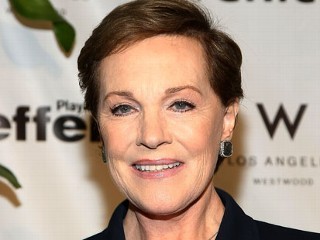
Julie Andrews biography
Date of birth : 1935-10-01
Date of death : -
Birthplace : Walton-on-Thames, Surrey, England
Nationality : English
Category : Arts and Entertainment
Last modified : 2011-09-09
Credited as : actress, author, Emmy, Grammy, BAFTA
0 votes so far
Andrews had a revival of her film career in the 2000s in family films such as The Princess Diaries (2001), its sequel The Princess Diaries 2: Royal Engagement (2004), the Shrek animated films (2004-2010), and Despicable Me (2010). In 2003 Andrews revisited her first Broadway success, this time as a stage director, with a revival of The Boy Friend at the Bay Street Theatre, Sag Harbor, New York (and later at the Goodspeed Opera House, in East Haddam, Connecticut in 2005).
Andrews is also an author of children's books, and in 2008 published an autobiography, Home: A Memoir of My Early Years.
Julie Andrews was born Julia Elizabeth Wells on 1 October 1935 in Walton-on-Thames, Surrey, England. Her mother, Barbara Ward Wells (née Morris), was married to Edward Charles "Ted" Wells, a teacher of metal and woodworking, but Andrews was conceived as a result of an affair her mother had with a family friend.
In 1963, Walt Disney asked if she would like to star in his upcoming production, a lavish musical fantasy that combined live-action and animation. Julie said she would do it if she did not get to play "Eliza" in the pending film production of My Fair Lady (1964). She didn't, and so she made an auspicious film debut in Walt Disney's Mary Poppins (1964), a huge hit which got her the Academy Award for Best Actress (Audrey Hepburn, who played "Eliza" in the My Fair Lady (1964) film, wasn't even nominated).
Now, Julie was a real star, and it was her star power that helped make her third film, The Sound of Music (1965), the highest-grossing movie of its day and one of the highest-grossing of all time. The only problem was that now audiences identified her only with singing, sugary-sweet nannies and governesses. Therefore, they could not accept her in dramatic roles (The Americanization of Emily (1964) and definitely not in an Alfred Hitchcock thriller Torn Curtain (1966)). In addition, the box-office showings of the musicals Julie subsequently made increasingly reflected the negative effects of the musical-film boom that she helped to create. Thoroughly Modern Millie (1967) was for a time the most successful film Universal had released, but it still could not hope to compete with Mary Poppins or The Sound of Music for worldwide acclaim and recognition. And Star! (1968) and Darling Lili (1970) both bombed at the box office.
Fortunately, Julie did not let this keep her down. She did work in nightclubs and hosted a TV variety series in the 1970s. Then, she made a comeback to movies with an appearance in 10 (1979), directed by husband Blake Edwards. He helped continue to keep her on the rise by directing her in subsequent roles that were entirely different from anything she had been seen in before. There was the movie star who bared her breasts on-screen in S.O.B. (1981), the woman playing a man playing a woman in Victor Victoria (1982) and the sheer novelty of seeing Julie Andrews in these roles, not to mention her brilliant performances in both of them, undoubtedly helped make them successes.
She continued acting throughout the 1980s and 1990s in movies and TV, hosting several specials and starring in a short-lived sitcom. In 1995, she returned to Broadway to star in the musical version of Victor Victoria (1982) and was again a smash. Sadly, an operation on her vocal chords left her singing voice badly damaged in 1998, but she has not let even this stop her, giving a show-stopping appearance at the 1999 Tony Awards and appearing in the TV-movie One Special Night (1999) (TV). Julie Andrews, in all her many incarnations, will no doubt keep us very entertained for years to come.
















